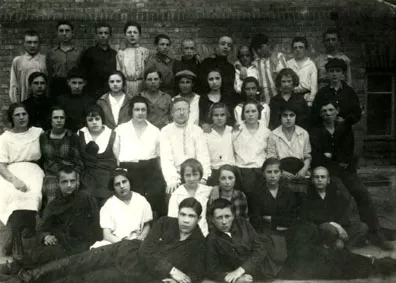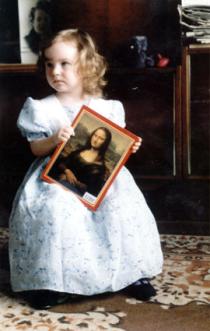Semyon Levbarg with his class
This is my 7th grade class. I am on the right in the 2nd row and my friend Lev Goldman is the 4th in the upper row. There were only few that survived the Great Patriotic War. Many perished at the front or in the Babi Yar. This photo was taken shortly before graduation in 1927.
On 20th July 1914 I was born and named after my grandfather Solomon Levbarg. One of my first memories was that we were hiding in the basement of our house from pogrom makers during the Civil War. I couldn't understand why we had to be quiet and my sister literally clogged my mouth with a piece of bread or other food to make me sit quiet. From the first years of my life I was used to traditional Jewish way of life that our family led. When I turned six I went to the synagogue with my parents on Saturday. My father and I were on the first floor and my mother went up to the gallery where she stayed with other women. We celebrated all Jewish holidays at home. At Yom Kippur my father and mother fasted and my father stayed at the synagogue a whole day. My sister and I also fasted after we turned 6.
When I turned five a melamed from the synagogue began to teach me at home. He taught me Yiddish, basics of religion and general education and told me about the history of Jewish people. This was like a cheder for one pupil. I went to school at 6 and a half. This was a Jewish primary school at first, but after I finished my second year it was made a Russian school. However, the only difference was that we switched to the Russian language since the curriculum remained without changes. I stayed in this school. My father was right to think that one needed to know Russian to do better in the future. I studied well. I was fond of mathematics and physics. I became a pioneer at school. I remember the ceremony in thee concert hall at school. Senior pupils tied read neckties on us and took an oath of devotion to the cause of Lenin. My father had no objections to this. He understood that I had to keep pace with the requirements of a new way of life. Even though I was a pioneer I went to the synagogue with my parents on holidays. Of course, I didn't wear my necktie when going to the synagogue. He didn't tell me to go to the synagogue, but I knew that he liked it when I went there so I wanted to please him. I also had a bar mitzvah at the age of 13. My father prepared me to this ceremony teaching me to put on a tefillin. He understood that I would not be religious in the future, but wanted me to go through this ritual. Of course, none of my friends - and I had Jewish, Ukrainian and Russian friends - knew that I had a bar mitzvah. If I had spoken about it I might have been expelled from the pioneer organization and probably from school. This was in late 1920s, when any religion was declared outlawed and persecuted. He knew that it was better to keep silent about things at that period of time. I didn't even tell my best friend Lyova Golfman about this.
After finishing lower secondary school I entered the Ship Mechanics Faculty of Kiev River Technical School. I didn't mention to my new friends that I met there that my father was a deeply religious man and didn't invite my friends home. Since I didn't mention to anyone at school that my father was a gabbai I managed to join the Komsomol league at this school. Although I respected my father's faith I was a young man of that time: I believed in communist ideas and took an active part in the first five-year plans and construction of communism. I was an active Komsomol member and took part in Komsomol meetings and was also a subbotnik. In 1930s I changed my name from Solomon to Russian Semyon. My father insisted that I did it. I had to write a request to have my name changed where I wrote that I wanted to change it for the sake of euphony, but my father explained to me that this would help me in the future.












